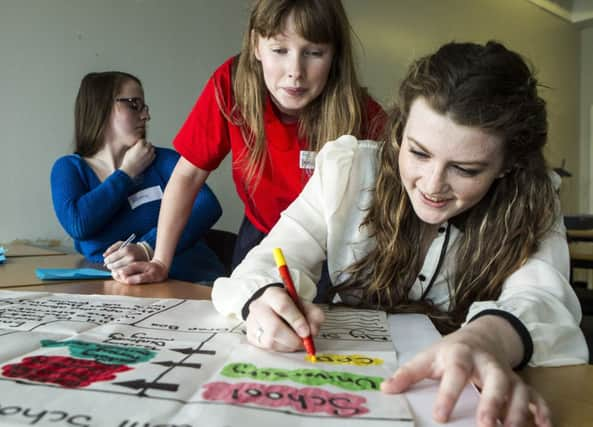Teaching our children to aim higher


In his sixth year at school, Mark McDowell wasn’t sure he was cut out for university. Then he started working with Glasgow Caledonian University’s Caledonian Club.
“It made university seem like a possibility,” he said. “The mentors were inspiring and were able to show me what university life was like. Being able to visit the campus was great as it made me realise that university wasn’t as daunting as I thought and I could see myself fitting in.”
Advertisement
Hide AdAdvertisement
Hide AdMark enrolled with GCU in 2010, the first in his family to do so. Four years later he graduated with a first-class Honours BSc in Forensic Investigation.
Mark’s story is typical of the Caledonian Club, the leading project in a network of widening participation and community engagement initiatives at the university, working with more than 8,750 young people and 2,600 parents, and operating in Glasgow, London and, soon, New York.
The Caledonian Club was introduced six years ago by GCU principal Professor Pamela Gillies as an experiment, inspired by growing evidence that the earlier children were engaged in developing basic life skills such as reading and writing, the better their educational outcomes and life opportunities in the long term. So GCU funded the earliest version of the club, which created closer links between university and primary, secondary and nursery education, and which importantly also worked with parents.
The club begins its work with children in pre-school nursery classes, introducing them to a fictional character called Molly who helps them understand their journey through the various school stages. A host of different engagement activities, many of them delivered on campus, follow – these take advantage of mini-projects and challenges to ensure the children and young people are comfortable on campus and have given detailed thought to what they will do after leaving school.
The Professor’s Challenge in S6, for example, gives pupils a real-life business brief, working with leading businesses such as Dell Scotland, IBM and Albert Bartlett, raising pupils’ aspirations and boosting their confidence. By this stage, pupils will have engaged with the Caledonian Club throughout their education, and will be comfortable with the expectations of a higher education institution.
Its success is reflected in previous members of the club, studying at GCU and working as mentors. They return to their communities as role models, making an impact in the most disadvantaged communities in Glasgow and London.
But why focus on working with children at such a young age when most widening participation initiatives concentrate on bridging the gap between secondary school and enrolling in university?
Scotland is widely recognised for its first-class universities. However, the sector is often criticised for failing to do enough to encourage potential students from all backgrounds to take part. GCU’s own track record in this area is excellent.
Advertisement
Hide AdAdvertisement
Hide AdSome 96 per cent of GCU students come from state schools, compared with 88 per cent for the Scottish sector as a whole; 34 per cent of undergraduate students are from a disadvantaged background, compared with a Scottish average of 27 per cent; and 20 per cent of Scottish entrants come from the lowest quintile of multiple deprivation, compared with a sector average of 13 per cent.
Of course, there is still scope to improve.
The university has invested almost £1.5 million in the club’s mission to develop key life skills and raise aspirations for positive destinations. This is why the club also works closely with parents and carers, sharing the university’s resources and reinforcing the opportunities that higher education can bring.
Anne O’Grady, headteacher of Cloan Nursery in Glasgow, explains: “For the nursery there is no downside – it is a real partnership between ourselves and GCU. It is a shared vision.”
Early research carried out by GCU’s Professor Caroline Parker suggested that the club had a profound impact on young people. Participation in the club significantly improved confidence in communication, team skills, attitude towards schoolwork and belief in the ability to enter higher education among secondary school pupils, and also found a marked improvement in the number of pupils who felt able to make informed choices about their future.
Beyond the Caledonian Club, GCU continues to show its commitment to widening participation through a breadth of programmes that support the journey through school, college and university. The Schools and Colleges Engagement Transition Team works with partner schools and colleges, increasing the total number of learners who can benefit from GCU’s innovative approach to widening participation.
After receiving £1m from the Scottish Funding Council, and in partnership with Glasgow City Council, GCU opened the Advanced Higher Hub in August 2013. The Hub supports sixth-year students from 18 Glasgow schools in the study of Advanced Highers, complementing those being offered by schools. The opportunity to study on a university campus supports learners to make the transition to higher education successfully.
GCU also works closely with college students to make the transition to university as seamless as possible through the university’s College Connect Strategy and its flagship activity, the College Connect Academy. Additionally, the Mentoring and Peer Support programme provides students with access to peer support throughout their time at GCU.
Together, these projects highlight an innovative partnership approach, which builds on the early success of the Caledonian Club, and which maximises opportunities for pupils, students and families in the many communities where the university works.
• Eleanor Wilson is director of UK Recruitment and Outreach at Glasgow Caledonian University www.gcu.ac.uk
SEE ALSO